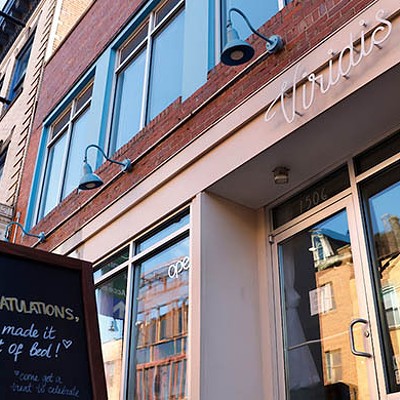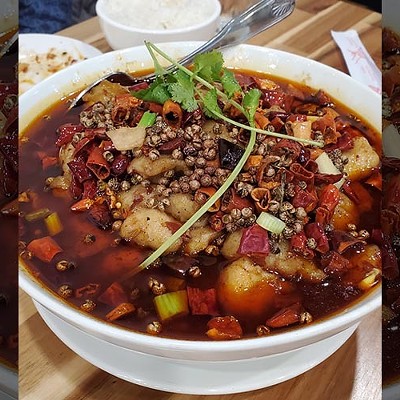Monday, November 12, 2018
When Farmer Harry Met Chef Sally
Local Food Matchup
Last time you visited at restaurant in Pittsburgh, did the server mention the name of the farm where the chicken was raised? Or did the specials menu include the location of the producer who grew the fresh beets? Or did you enjoy a locally crafted beer?
Farm-to-table dining is more than a fad. As more and more Pittsburgh area restaurants begin sourcing locally, the ripple effect is impacting everyone in the region. The carbon footprint of the food transportation and refrigeration and packaging is drastically reduced; the regional economy is stimulated as dollars from restaurants are fed back into local farms; and most noticeably, foods are fresher and contain fewer preservatives, which makes them taste better. Better tasting food makes for more and for happier customers.
But with all of this local sourcing, have you ever stopped to wonder: how do restaurants and local farmers actually meet? Allegheny County has more than 400 farms, and more than 3,000 accommodations and food services establishments, according to recent census data. Is there some kind of speed-dating where these symbiotic enterprises can lock eyes across a crowded room?
Yes, actually, there is.
The fourth Local Food Matchup is a semi-annual matchmaking event that brings together farmers and restaurants, as well as growers, food and beverage producers, institutional buyers, retailers, and service and resource providers. On December 3 from 3 to 7 p.m. at Threadbare Cider, these local entrepreneurs can rub shoulders, exchange business cards, enjoy cider and snacks, and most importantly, build relationships that benefit their businesses, customers, and the region.
“We made some terrific contacts at the 2017 Pittsburgh Local Food Match-Up, which were instrumental in building our business,” recalls Steve Loevner of Allison Park’s Goat Rodeo Farm and Dairy (known for their award winning cheese). “We’re looking forward to this year’s event, and to further expanding distribution.”
Steve is far from the only one who noticed the benefits of the Local Food Matchup. Dozens of businesses on both the production and hospitality side turned out last year, and even more are expected to show up for what’s certainly going to be the most productive matchmaking session in Pittsburgh this season.
“One of the best ways a restaurant can connect the social and environmental aspects of its operations is through how it sources its food,” says Sustainable Pittsburgh Restaurant program manager Rebecca Bykoski, one of four event organizers. “Responsible sourcing means that a restaurant understands the value in supporting local farmers and businesses, providing guests with fresh, quality products, reducing environmental impacts by streamlining its supply chain, and contributing to a stronger local economy.”
Sustainable Pittsburgh Restaurants is an initiative of Sustainable Pittsburgh that champions and supports local restaurants and food industry businesses by coordinating events and leading sustainability initiatives throughout the city. Their most public-facing initiative is their restaurant designation, where restaurants complete a self assessment of sustainability practices to earn recognition for their commitment to economic, environmental, and social actions that benefit the region.
Joining Sustainable Pittsburgh Restaurants in planning the event are three well-known organizations that are equally dedicated to the health and future of the Pittsburgh region:
● Farm to Table Western PA is a business-to-business networking group that hosts events and networking opportunities to help encourage people to eat and support local food.
● The Southwestern Pennsylvania Commission is a forum for public planning and collaboration for the ten counties that make up southwestern Pennsylvania, offering numerous programs and service, including some geared toward helping small and medium-sized businesses.
● The City of Pittsburgh Sustainability and Resilience Team spurs collaboration to help promote a healthy environment and equitable economic landscape throughout the Pittsburgh region.
“Agriculture is a very important part of our regional economy,” said Jim Hassinger, the executive director of the Southwestern Pennsylvania Commission. “Support for local food production and sales advances our region’s plan for more resilient communities.”
Joining in on the Local Food Matchup is a great way for restaurants to start. For more information and how to register, visit EatSustainably.org.
Farm-to-table dining is more than a fad. As more and more Pittsburgh area restaurants begin sourcing locally, the ripple effect is impacting everyone in the region. The carbon footprint of the food transportation and refrigeration and packaging is drastically reduced; the regional economy is stimulated as dollars from restaurants are fed back into local farms; and most noticeably, foods are fresher and contain fewer preservatives, which makes them taste better. Better tasting food makes for more and for happier customers.
But with all of this local sourcing, have you ever stopped to wonder: how do restaurants and local farmers actually meet? Allegheny County has more than 400 farms, and more than 3,000 accommodations and food services establishments, according to recent census data. Is there some kind of speed-dating where these symbiotic enterprises can lock eyes across a crowded room?
Yes, actually, there is.
The fourth Local Food Matchup is a semi-annual matchmaking event that brings together farmers and restaurants, as well as growers, food and beverage producers, institutional buyers, retailers, and service and resource providers. On December 3 from 3 to 7 p.m. at Threadbare Cider, these local entrepreneurs can rub shoulders, exchange business cards, enjoy cider and snacks, and most importantly, build relationships that benefit their businesses, customers, and the region.
“We made some terrific contacts at the 2017 Pittsburgh Local Food Match-Up, which were instrumental in building our business,” recalls Steve Loevner of Allison Park’s Goat Rodeo Farm and Dairy (known for their award winning cheese). “We’re looking forward to this year’s event, and to further expanding distribution.”
Steve is far from the only one who noticed the benefits of the Local Food Matchup. Dozens of businesses on both the production and hospitality side turned out last year, and even more are expected to show up for what’s certainly going to be the most productive matchmaking session in Pittsburgh this season.
“One of the best ways a restaurant can connect the social and environmental aspects of its operations is through how it sources its food,” says Sustainable Pittsburgh Restaurant program manager Rebecca Bykoski, one of four event organizers. “Responsible sourcing means that a restaurant understands the value in supporting local farmers and businesses, providing guests with fresh, quality products, reducing environmental impacts by streamlining its supply chain, and contributing to a stronger local economy.”
Sustainable Pittsburgh Restaurants is an initiative of Sustainable Pittsburgh that champions and supports local restaurants and food industry businesses by coordinating events and leading sustainability initiatives throughout the city. Their most public-facing initiative is their restaurant designation, where restaurants complete a self assessment of sustainability practices to earn recognition for their commitment to economic, environmental, and social actions that benefit the region.
Joining Sustainable Pittsburgh Restaurants in planning the event are three well-known organizations that are equally dedicated to the health and future of the Pittsburgh region:
● Farm to Table Western PA is a business-to-business networking group that hosts events and networking opportunities to help encourage people to eat and support local food.
● The Southwestern Pennsylvania Commission is a forum for public planning and collaboration for the ten counties that make up southwestern Pennsylvania, offering numerous programs and service, including some geared toward helping small and medium-sized businesses.
● The City of Pittsburgh Sustainability and Resilience Team spurs collaboration to help promote a healthy environment and equitable economic landscape throughout the Pittsburgh region.
“Agriculture is a very important part of our regional economy,” said Jim Hassinger, the executive director of the Southwestern Pennsylvania Commission. “Support for local food production and sales advances our region’s plan for more resilient communities.”
Joining in on the Local Food Matchup is a great way for restaurants to start. For more information and how to register, visit EatSustainably.org.
Tags: Local Food Matchup , SPR , sustainable , sustainability , restaurants , restaurant industry , food , ecology , green , eco-friendly , Sustainable Pittsburgh Restaurant , Image
















